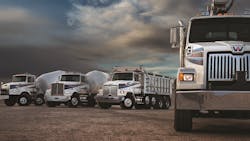'Pretty good story’: Daimler to boost Western Star capacity
Daimler Truck Holding AG executives could boost capacity of the company’s line of Western Star vocational trucks to meet demand that is expected to outpace the broader market in 2024.
Speaking to analysts Nov. 7 after Daimler reported its third-quarter results, CEO and Interim CFO Martin Daum said the Western Star team’s order book is sold out through the first two quarters of next year and that the lineup is poised to grow its market share.
“The factories are really packed and therefore, we go full steam” in 2024, Daum said. “We might even increase capacity. This is a pretty good story.”
Daum didn’t elaborate on the scope and timeline of any investments in new capacity, and Daimler spokespeople said the company isn’t providing details at this point about production plans. Western Star has been under the Daimler Truck North America umbrella since 2000 and runs factories in Portland, Oregon, and Cleveland, North Carolina, that make the 47X and 49X series of vocational trucks as well as the 57X on-highway truck launched last year to target owner-operators and small fleets.
See also: First of Daimler’s new medium-duty EV trucks reach U.S. shores
Daum and the Daimler Truck team aren’t the only market players upbeat about the market for vocational trucks. Paccar Inc. CEO Preston Feight late last month said the sector is “probably just spinning up” as investments in infrastructure and nonresidential construction have been growing strongly. Paccar’s Peterbilt and Kenworth brands, Feight said, control about 40% of the vocational market, and the company’s plants can comfortably adapt their output if demand continues to grow.
“That will be just fine for us if we see that shift,” Feight said on the heels of reporting Paccar’s Q3 results. “It will be good for Paccar and good for our customers.”
Daimler Truck posted a net profit of $1.02 billion in the three months ended Sept. 30, which was down 3% from the same period of 2022, as sales ticked up 3% to nearly $14.8 billion. The company’s North American division sold more than 47,200 vehicles during the quarter, a year-over-year drop of 4%, and revenues slipped 7% to about $6.1 billion, while profits were flat at $1.2 billion.
See also: Freightliner eM2 production begins
Year to date, North American unit sales are up 7%, and production has climbed 9% to a little more than 146,000 vehicles. Orders, however, have slipped 7% to about 102,000, a trend that Daum—echoing Feight and his peers at Navistar parent company Traton—expects will continue next year as some shippers normalize their order pace after several years of strong growth.
Detailing his team’s outlook for 2024, Daum said body builders and others in Daimler’s supply chain are—despite a few persistent sticking points—nearly all moving back to normal levels and providing a welcome sense of steadiness. Similarly, he said many large fleets still have well-functioning replacement programs that will help the overall sector go from a “blazing hot market to a normal, good market.”
“It’s a market where a rising tide potentially is not lifting all ships,” Daum said of the competitive outlook as that downshift happens. “I’m pretty confident we are one of the ships that will stay very well afloat.”
The Frankfurt-listed shares of Daimler Truck (Ticker: DTG) gave up about 4% on the heels of executives’ earnings report and closed trading last week around $30.10. They are basically unchanged over the past six months, leaving the company with a market capitalization of about $26 billion.
About the Author
Geert De Lombaerde
Senior Editor
A native of Belgium, Geert De Lombaerde has more than two decades of experience in business journalism. Since 2021, he has written about markets and economic trends for Endeavor Business Media publications FleetOwner, Healthcare Innovation, IndustryWeek, Oil & Gas Journal, and T&D World.
With a degree in journalism from the University of Missouri, he began his reporting career at the Business Courier in Cincinnati. He later was managing editor and editor of the Nashville Business Journal. Most recently, he oversaw the online and print products of the Nashville Post and reported primarily on Middle Tennessee’s finance sector and many of its publicly traded companies.

